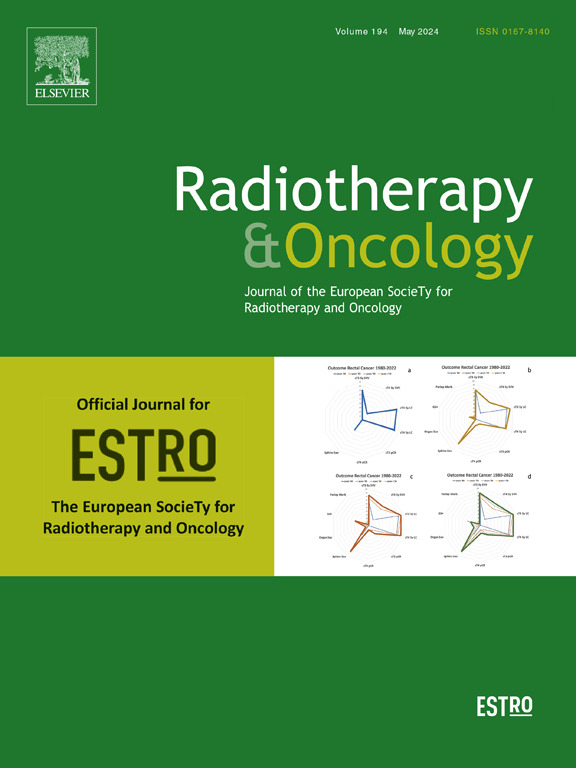DURATION OF SYSTEMIC THERAPY IN PATIENTS WITH METASTATIC EGFR-MUTATED NSCLC AND BRAIN METASTASES: FIRST VERSUS THIRD GENERATION TKIS
IF 5.3
1区 医学
Q1 ONCOLOGY
引用次数: 0
Abstract
Purpose:
New-generation epidermal growth factor receptor (EGFR) tyrosine kinase inhibitors (TKIs), such as Osimertinib, demonstrate high central nervous system (CNS) activity in EGFR-mutated non-small cell lung cancer (NSCLC). Clinical guidelines recommend TKI monotherapy as an effective option for small, asymptomatic brain metastases (BM). We hypothesize that patients receiving Osimertinib remain on therapy longer than those on first- or second-generation TKIs. This study evaluates treatment duration in a real-world setting using a healthcare administrative database.
Materials and Methods:
We analyzed data from the Institute for Clinical Evaluative Sciences (ICES), a provincial health administrative database, identifying patients diagnosed with non-squamous NSCLC from 2002 to 2022. Eligible patients received first-line EGFR-targeted therapy with either Gefitinib or Osimertinib. Brain radiotherapy receipt was used as a surrogate for BM presence. Patients under 18 or those with a prior cancer diagnosis within five years were excluded. The primary outcome was the duration of first-line systemic therapy. Overall survival (OS) was estimated using the Kaplan-Meier method. Propensity score matching adjusted for baseline factors influencing systemic therapy duration, including age, sex, rurality index, Charlson and Elixhauser comorbidity indices, income quintile, and treatment year.
Results:
Among 3,088 screened patients with EGFR-mutated NSCLC, 1,243 received Osimertinib and 1,845 received Gefitinib as first-line therapy. A total of 761 patients had BM and met inclusion criteria (Osimertinib: 308; Gefitinib: 453). The median first-line systemic therapy duration was significantly longer in the Osimertinib cohort (327 versus 190 days, p<0.001). Median OS was also higher with Osimertinib (21.8 versus 14.0 months, p<0.001). After propensity score matching (n=168, 84 in each cohort), patients on Osimertinib first line had a median duration of 390 days versus 154 days per patients receiving Gefitinib. There was no longer a significant difference in OS, with a median OS of 16.2m versus 14.7m in the same respective cohorts (p=0.36).
Conclusions:
Patient with brain metastases treated with Osimertinib remained on this line of systemic therapy longer than patients treated with Gefitinib. These findings remained consistent after propensity score matching. These findings suggest that despite BM, patients on Osimertinib may have sustained efficacy in this patient population.
转移性egfr突变的NSCLC和脑转移患者的全身治疗持续时间:第一代与第三代tkis
目的:新一代表皮生长因子受体(EGFR)酪氨酸激酶抑制剂(TKIs),如奥西替尼,在EGFR突变的非小细胞肺癌(NSCLC)中显示出高中枢神经系统(CNS)活性。临床指南推荐TKI单药治疗作为小的无症状脑转移瘤(BM)的有效选择。我们假设接受奥西替尼治疗的患者比接受第一代或第二代TKIs治疗的患者持续治疗的时间更长。本研究使用医疗管理数据库评估真实世界环境中的治疗持续时间。材料和方法:我们分析了来自临床评估科学研究所(ICES)(一个省级卫生行政数据库)的数据,确定了2002年至2022年诊断为非鳞状非小细胞肺癌的患者。符合条件的患者接受吉非替尼或奥西替尼的一线egfr靶向治疗。脑放射治疗作为脑脊髓瘤存在的替代。18岁以下的患者或5年内有过癌症诊断的患者被排除在外。主要终点是一线全身治疗的持续时间。采用Kaplan-Meier法估计总生存期(OS)。倾向评分匹配调整了影响全身治疗持续时间的基线因素,包括年龄、性别、农村指数、Charlson和Elixhauser合并症指数、收入五分位数和治疗年份。结果:在筛选的3088例egfr突变的NSCLC患者中,1243例接受奥西替尼治疗,1845例接受吉非替尼作为一线治疗。共有761例BM患者符合纳入标准(奥西替尼:308例;吉非替尼:453例)。在奥西替尼队列中,一线全身治疗的中位持续时间明显更长(327天对190天,p<0.001)。奥西替尼组的中位OS也更高(21.8个月vs 14.0个月,p<0.001)。在倾向评分匹配后(每个队列中n= 168,84),奥西替尼一线患者的中位持续时间为390天,而吉非替尼患者的中位持续时间为154天。在相同队列中,OS不再有显著差异,中位OS为16.2m,而14.7m (p=0.36)。结论:脑转移患者接受奥西替尼治疗的时间比接受吉非替尼治疗的时间更长。这些发现在倾向评分匹配后保持一致。这些发现表明,尽管有BM,奥西替尼患者可能在该患者群体中具有持续的疗效。
本文章由计算机程序翻译,如有差异,请以英文原文为准。
求助全文
约1分钟内获得全文
求助全文
来源期刊

Radiotherapy and Oncology
医学-核医学
CiteScore
10.30
自引率
10.50%
发文量
2445
审稿时长
45 days
期刊介绍:
Radiotherapy and Oncology publishes papers describing original research as well as review articles. It covers areas of interest relating to radiation oncology. This includes: clinical radiotherapy, combined modality treatment, translational studies, epidemiological outcomes, imaging, dosimetry, and radiation therapy planning, experimental work in radiobiology, chemobiology, hyperthermia and tumour biology, as well as data science in radiation oncology and physics aspects relevant to oncology.Papers on more general aspects of interest to the radiation oncologist including chemotherapy, surgery and immunology are also published.
 求助内容:
求助内容: 应助结果提醒方式:
应助结果提醒方式:


